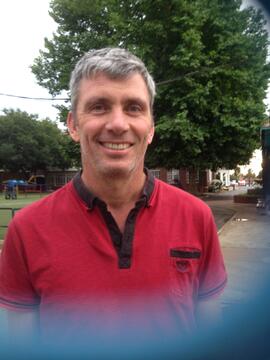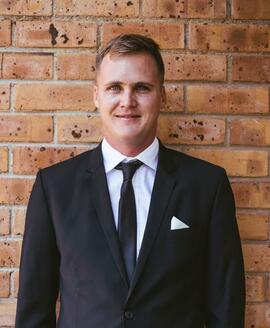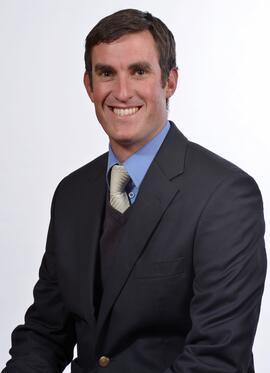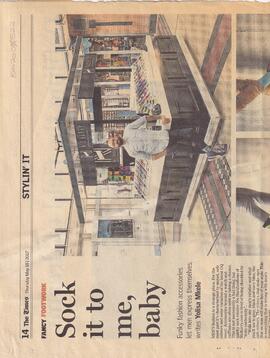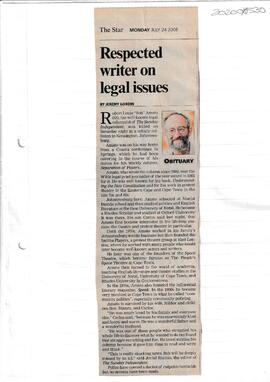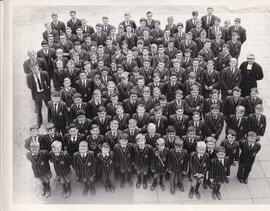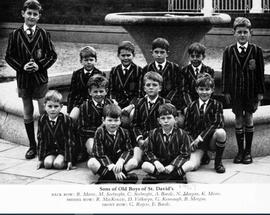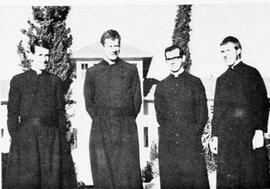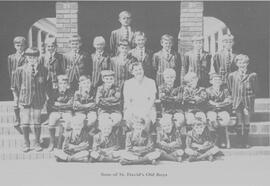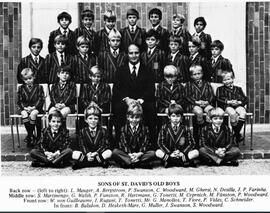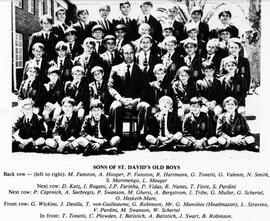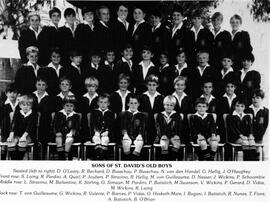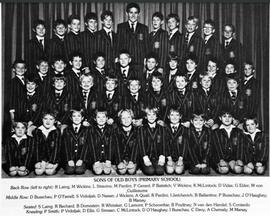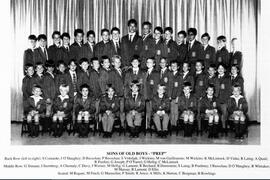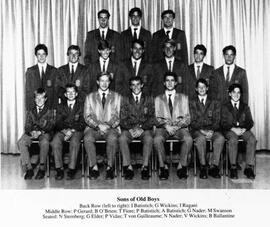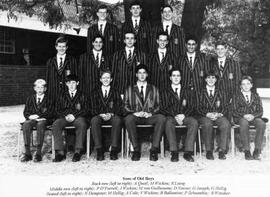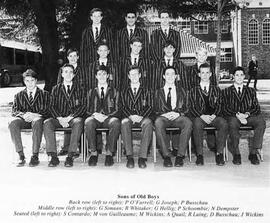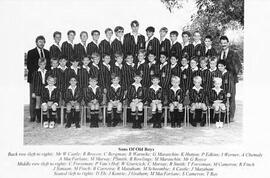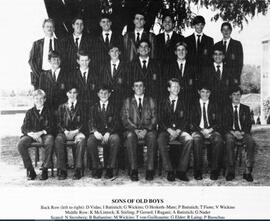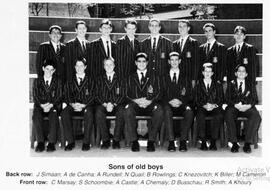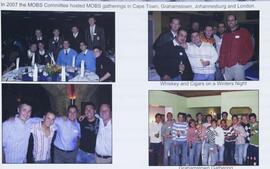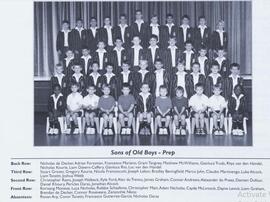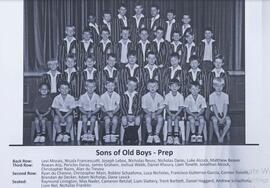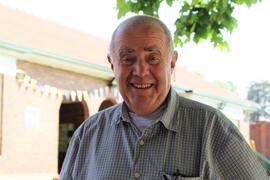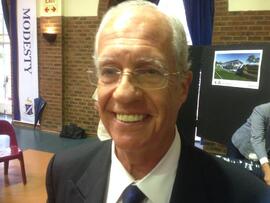Interview withRonald Morgan 1948 – 1958
In January of 1948, as a very small, sports mad boy, I arrived at the splendid college set in
the rural, leafy suburb of Inanda, surrounded by a few houses and a horse-loving
community.
On my first day I was accompanied by my brother, Harold, proudly dressed in my new blue
and gold uniform. I wore a cap and a tie. Hailing from Parktown North in Johannesburg, I
came from a devout Catholic family of six children. Times were difficult and, although we
were not rich, my parents somehow managed to provide a good education for my brother
and I, as well as for my four sisters. We were all educated by nuns and brothers. I was
proud of my school and of my family.
In 1948 many of the roads were still untarred.Aided by lift clubs from Mrs Swanson and Mrs
Funston, we were transported to the college. As we got older we cycled to school, a distance
of 10kms, and on occasion I used to walk home armed with my books and sporting
equipment.
What memorable and unforgettable times they were! I was delighted and privileged to be
able to attend a school that had such dedicated teachers. I was passionate about sport,
particularly ball games, with cricket, soccer, tennis and hockey being my favourites.
I recall being taught by Mrs Brick in grade 0. She was a small and soft-spoken teacher who
taught me how to read. My grade 6 teacher was the legendary Mrs. V. Kempster. She was
head mistress for many years. A strict disciplinarian, she ruled with an iron fist. I will never
forget the leather strap she wielded! Our hands would be so cold on those freezing winter
mornings and one really felt the sting. Nevertheless, I received my best marks that year!
On the sports field I excelled, often scoring over 50 runs in a match. I won three cricket bats
and a pair of gloves. As the U12 soccer captain, I scored many goals as a striker. My family
were all sports orientated and my dad, brother and brother-in-laws all encouraged me to
practise hard and to be, above all else, a good sportsman.
My high school memories will always remain obtaining colours for cricket, rugby and tennis,
being captain of the Cricket 1st X1 and couse Captain of Bishops.
Over the years I have returned periodically to visit my family and the school. I have seen the
school grow and can see that the good work started by the Marist Brothers has continued.
The teachers appear to be dedicated and the learners polite and neatly dressed. I am
pleased to see that the christian values that were instilled in me still exist. The new
buildings, the Chapel and the large hall are all recent acquisitions and are very impressive.
How I wish I had been able to play hockey on the school’s Astroturf!
My family has been part of the school’s history since 1942: The Morgans, the Barales, the
Peels and the Broccos are all proud Marist boys. Today the Trudas continue this tradition.
We, as a family, have been honoured to be part of the Marist family.
In 1963 I qualified as a teacher and have taught in Cape Town, Kwa-Zulu Natal and, for a
short period, in Malawi. My last 20 years were spent teaching poor, rural African boys and
girls. I have now retired at the age of 75 after almost 50 years of teaching. During my travels
I met many Marist old boys who all remembered their school days with pride.
May the school continue to grow in love, friendship and under God’s guidance!
Confortore Esto Vir - Take courage, you will need it, and be a man!
I owe a deep sense of gratitude to the brothers, Br. Edwin (Principal), Br. Ralph (my first high
chool teacher), Br. Benedict, Br. Walter, Br. Anthony, Br. Ephrena and Br. Bonaventurer, and
many more.
During my 50 years of teaching in the various schools I tried to carry on the Marist ethos of
brotherhood, respect for others and dedication to my duties as an educator. In the process
of teaching I achieved merit awards and led many good citizens. I am grateful to all who
inspired me to be a good teacher through their encouragement and sound advice. Lastly I
thank God for his many blessings bestowed upon me. The future of the school is in His
hands.
Appendix: Our Family’s Achievements.
Harold Morgan (1942 –1948) – an excellent soccer player who played on the right wing for
the Marist old boys club. A qualified quantity surveyor, he was instrumental in drawing up
the plans for the new Br Urban Science lab.
Stan Barale (1946 - ) – was the first head boy of the college.
Frank Barale (1946 – 1954) – received colours for rugby and athletics and later played
scrum-half for the Natal U/20 team.
Lorenzo Brocco (1963) – a man for all seasons, he was head boy of the day scholars,
captain of cricket and rugby, head of the Sodality and captain of Bishops house. He became
president of the old boys society and served on the PTA for several years.
The Peel Family: Kevin (1960 – 1975), John (1967 – 1977) and Michael (1965 – 1975) all
contributed. John was an excellent cricketer and rugby player. Whilst in the army he
represented the SA defence force at hockey. Michael was head boy of the school in 1975,
played cricket for the Transvaal Nuffield team at the age of 16. He captained the 1st XV
rugby team and the 1st X1 cricket team. Today he is a respected nature conservationist in
the Kruger National Park advising the game farms on what grasses to grow and how many
animals to include.
Ronald Morgan – Captain of Bishops, cricket X1 captain, colours for cricket, rugby and
tennis. Represented Transvaal at hockey whilst still at school. Was chosen in 1958 to
represent the Transvaal Nuffield team but withdrew in order to study in Australia at the
Marist Noviciate. After leaving the Order, represented the Western Province rugby union as
a selection (U/13). Whilst living in Cape Town, he served for 10 years on the primary school
committee as a selector and a coach. In 1984 he managed the W.P primary schools cricket
team captained by Gary Kirsten. Spent many years coaching African boys and was part of
sports development for years.

